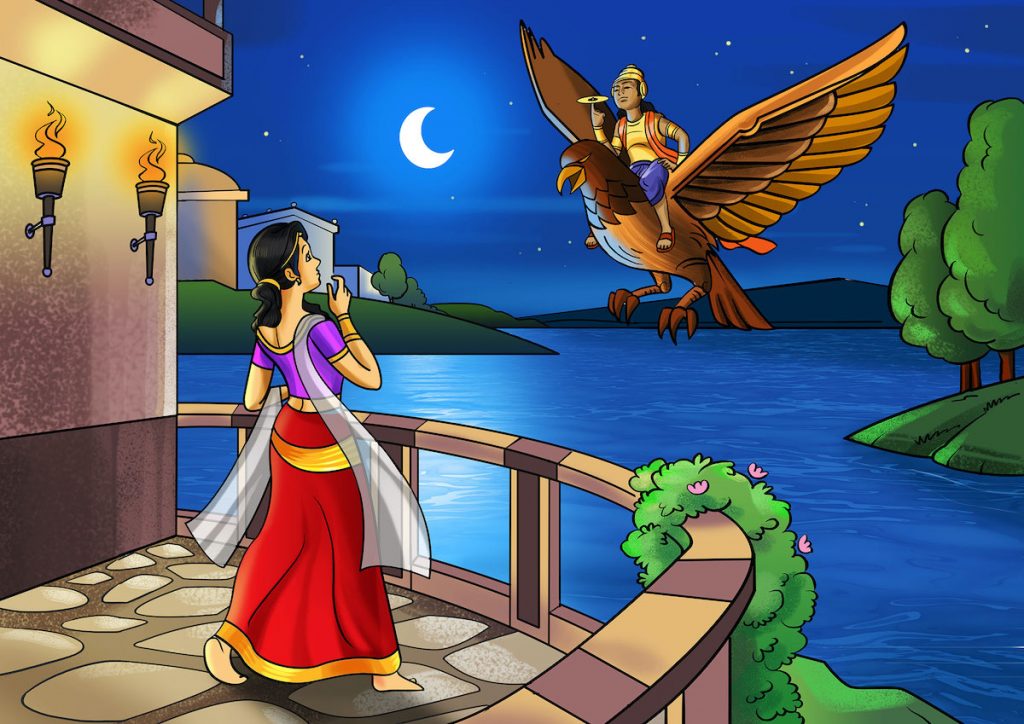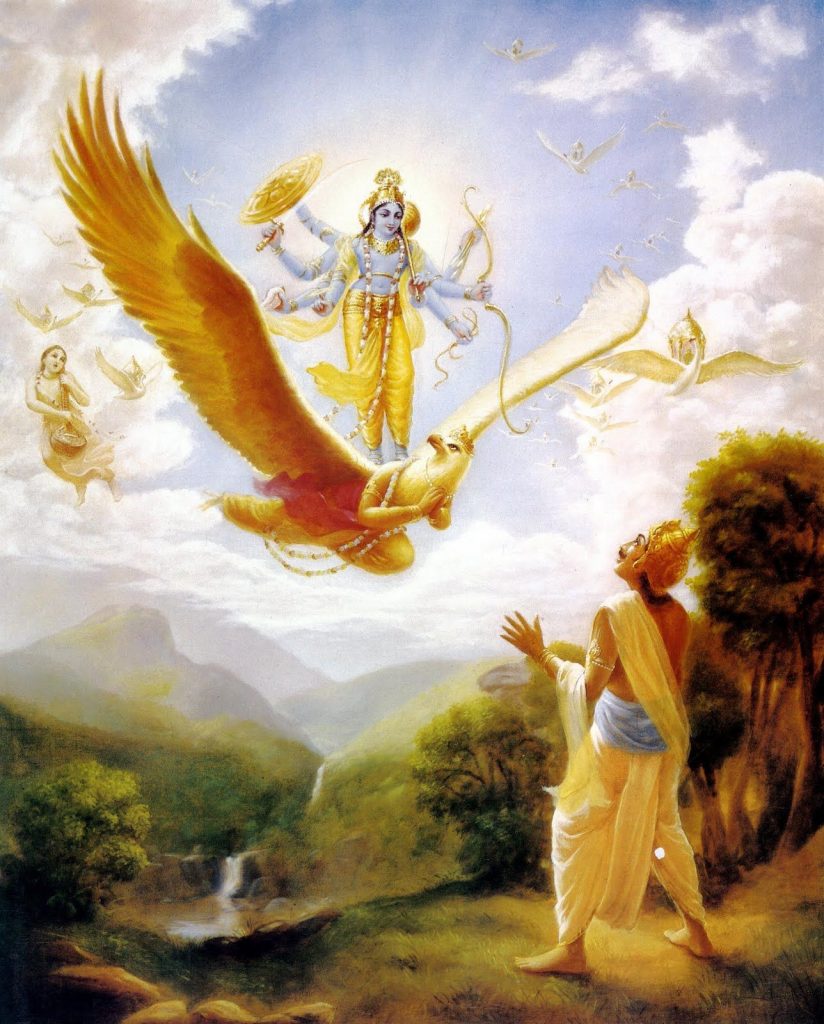In a few days, the king’s armies crumbled under the combined might of his enemies -they drove him back and entered the kingdom as well. The king and his guards were now locked in the fort, and unable to step out. Unaware of his true identity, the king kept sending camphor, incense, flowers and delicacies to his son-in-law everyday, hoping to be saved. One day, he sent another message to be delivered through his daughter, who conveyed it to the weaver – ” My Lord! The fortress will surely be attacked tomorrow morning. Food, fuel and everything else is nearly over. The soldiers are heavily injured, most of them are dead. So please, help us!”

Having heard this, the weaver started to think…
“If this fortress is destroyed, I will be separated from this beautiful princess…let me try something. I will appear on top of the fort, on this Garuda. It can be that the enemy kings take me to be the real Narayana, get frightened and withdraw, and our soldiers, seeing me on their side, get encouraged and fight harder. It is said…”
निर्विषेणापि सर्पेण कर्तव्या महती फणा ।
विषं भवतु वा माभूत् फणाटोपो भयङ्करः ॥ २२५ ॥
nirviṣeṇāpi sarpeṇa kartavyā mahatī phaṇā |
viṣaṃ bhavatu vā mābhūt phaṇāṭopo bhayaṅkaraḥ || 225 ||
Even if a king cobra does not have any more poison in it’s fangs, it should keep raising its hood. Whether there is poison or not, the sight of the raised hood is frightening in itself.
“And even if I die in the process, what can be better than dying for your country? It is said…”
गवाम् अर्थे ब्राह्मणार्थे स्वाम्य्-अर्थे स्वीकृतेऽथवा ।
स्थानार्थे यस् त्यजेत् प्राणांस् तस्य लोकाः सनातनाः ॥ २२६ ॥
gavām arthe brāhmaṇārthe svāmy-arthe svīkṛte’thavā |
sthānārthe yas tyajet prāṇāṃs tasya lokāḥ sanātanāḥ || 226 ||
One who gives up his life for the sake of nature, or a learned man, or his master, or a woman, or his country, attains liberation.
चन्द्रे मण्डल-संस्थे विगृह्यते राहुणा दिनाधीशः ।
शरणागतेन सार्धं विपद् अपि तेजस्विना श्लाघ्या ॥ २२७ ॥
candre maṇḍala-saṃsthe vigṛhyate rāhuṇā dinādhīśaḥ |
śaraṇāgatena sārdhaṃ vipad api tejasvinā ślāghyā || 227 ||
When the moon takes the shelter of the sun (during new moon), the sun fights with Rahu to protect it. Likewise, fighting to protect those who take refuge in you is always praiseworthy.
And so, having decided to help the king, the weaver freshen up, and told the princess ” My dear! I will have food or water only after destroying the enemy, I will only meet you once this task is done. Inform your father that at sunrise, he should take his army and attack the enemy. I will remain in the sky, and make the enemy forces lose their strength and willpower, and your father’s armies would then be able to defeat them easily. I cannot kill them myself; that will result in them becoming free from the sins that they have committed, and attaining liberation. And so your father’s armies will have to kill them instead.
The princess bowed to the weaver, went to her father, and told him everything. The king, due to his immense faith in his son-in-law, gathered his remaining armies and at sunrise, prepared to open the doors of the fort, to attack the enemy. The weaver also mentally prepared himself for his imminent death, sat on the Garuda and stood on top of the fort.
Interesting, isn’t it? To fool one family is one thing, but would the weaver be able to fool all the enemy kings and their armies? Or will he die in the process? Does he have faith in his abilities, or is this just a foolhardy exercise? We are poised at an intriguing part of this story, and I am tempted to stop here and continue tomorrow…
But I won’t:)
Let’s see what happens…
Meanwhile, in Vaikuntha, Lord Narayana called Garuda to his presence. Laughing out loud, he said “Garuda! Do you know that a weaver impersonates me, complete with a wooden Garuda as well, and goes to make love to a princess?”
Garuda replied” My Lord! Yes, I am aware of his actions. What do you suggest we do?”
Lord Narayana said “The weaver has decided to die trying. He has already set out for the battlefield, and vowed not to return without victory. It is certain that he will die after being hit by the sharp arrows of the Kshatriya marksmen. If he dies, people will spread the word that Lord Vishnu and Garuda were killed by mere archers on the battlefield. Who will believe in us or worship us then?”. Garuda nodded pensively. Lord Narayana continued “And so it is better that you enter the wooden Garuda and make it alive with your powers, and let the Sudharshana chakra also come alive, and I will enter the body of the weaver and destroy the enemy forces. This way, the faith that people have in us will be preserved.”
Garuda agreed. Lord Narayana entered the body of the weaver, and by his powers, the weaver appeared on the battlefield, floating in the sky, seated atop the Garuda, radiating the divine presence of the Lord. It took just moments for him to extinguish the strength of the enemy soldiers, rendering them powerless. The king, having witnessed the divine form of Vishnu in person, fought with renewed vigour and finally achieved victory.
The weaver now descended to the ground, his happiness knowing no bounds. As he alighted from the Garuda, the king, his soldiers and everyone else present at the battlefield saw and recognised him to be the weaver. On being questioned, the weaver admitted all that had happened since the day he saw the princess at the festival. Hearing this, the king, in admiration of his courage, offered the hand of his daughter in marriage to the weaver, and also gifted him the kingdom. And so, the weaver and the princess lived happily ever after.

“And that is why”…concluded Damanaka,
सुप्रयुक्तस्य दम्भस्य ब्रह्माप्य् अन्तं न गच्छति ।
कौलिको विष्णु-रूपेण राज-कन्यां निषेवते ॥ २१८ ॥
suprayuktasya dambhasya brahmāpy antaṃ na gacchati |
kauliko viṣṇu-rūpeṇa rāja-kanyāṃ niṣevate || 218 ||
The secret of a well-thought-of conspiracy is not even known to the Gods. It is due to his well-hatched plan that the weaver enjoyed the company of the princess, in the form of Vishnu.
Hearing this, Karataka said…
to be continued…
